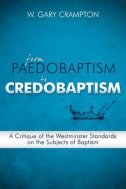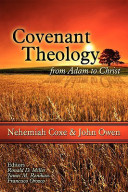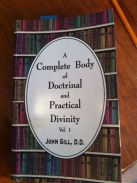Probably the answer depends on who you ask, and I'm no expert by any stretch, but just guessing here, compared to most moderns, he's probably strong in everything he speaks to. Super strength is reserved for Presbyterians though, we refuse to tap out, but you already knew that.

He touches on it, I'll quote from a section, and just for you I copied the entire public domain text from my Logos into Microsoft Word which weighs in at 518 pages as is without much spacing, here's the quote:
"
Episcopal and Presbyterial Government conjoined
BY the Order of the Church of England, all Presbyters are charged to (a) minister the Doctrine, and Sacraments, and the Discipline of Christ, as the Lord hath commanded, and as this Realm hath received the same. And that we might the better understand what the Lord had commanded therein, the Exhortation of St. Paul to the Elders of (b) the Church of Ephesus, is appointed to be read unto them at the time of their Ordination: Take heed unto your selves, and to all the Flock, among whom the Holy Ghost hath made you Overseers, to* rule the Congregation of God, which he hath purchased with his Blood.
Of the many Elders who in common thus ruled the Church of Ephesus, there was one President whom our Saviour in his Epistle to the Church, in a peculiar manner stileth the (c) Angel of the Church of Ephesus. And Ignatius in another Epistle written about twelve Years after to the same Church, calleth the Bishop thereof. Betwixt which Bishop and the Presbytery of that Church what an harmonious Consent there was in the ordering the Church-Government, the same Ignatius doth fully there declare by the Presbytery (with St. Paul) understanding the Company of the rest of the Presbytery or Elders who then had a Hand, not only in the delivery of the Doctrine and Sacraments, but also in the Administration of the Discipline of Christ. For further Proof whereof we have that known Testimony of Tertullian in his general Apology for Christians. In (e) the Church are used Exhortations, Chastisements, and divine Censures; for Judgment is given with great Advice as among those who are certain they are in the sight of God, and it is the Chiefest foreshewing of the Judgment that is to come, if any Man hath so offended that he be banished from the Communion of Prayer, and of the Assembly, and of all holy Fellowship.
The Presidents that bear rule therein are certain approved Elders who have obtained this Honour, and not by Reward, but by good Report. Who were no other (as he himself elsewhere intimateth) but those from (f) whose hands they used to receive the Sacrament of the Eucharist.
For with the Bishop, who was the Chief President (and therefore stiled by the same Tertullian in another place Summus (g) Sacerdos for distinction sake) the rest of the Dispensors of the Word and Sacraments were joined in the common Government of the Church. And therefore in matters of Ecclesiastical Judicature, Cornelius, Bishop of Rome, used the received Form of (h) gathering together the Presbytery.
Of what Persons that did consist, Cyprian sufficiently declareth, when he wished him to read his Letters to (i) the flourishing Clergy that there did reside or rule with him.
The presence of the Clergy being thought to be so requisite in matters of Episcopal Audience, that in the fourth Council of Carthage it was concluded (k) that the Bishop might hear no Man’s Cause without the Presence of the Clergy, which we find also to be inserted into the Canons of (l) Egbert, who was Archbishop of York in the Saxons Times, and afterwards into the Body of the (m) Canon-Law it self.
True it is, that in our Church this kind of Presbyterian Government hath been long disused, yet seeing it still professeth that every Pastor hath a right to rule the Church (from whence the Name of Rector also was given at first unto him) and to administer the Discipline of Christ, as well as to dispence the Doctrine and Sacraments. And the restraint of the Exercise of that Right proceedeth only from the Custom now received in this Realm: No Man can doubt but by another Law of the Land this Hindrance may be well removed. And how easily this ancient Form of Government, by the united Suffrages of the Clergy, might be revived again, and with what little shew of Alteration the Synodical Conventions of the Pastors of every Parish might be accorded, with the Presidency of the Bishops of each Diocess and Province, the indifferent Reader may quickly perceive by the perusal of the ensuing Propositions.
I
In every Parish the Rector or the incumbent Pastor, together with the Church-Wardens and Sidemen, may every Week take notice of such as live scandalously in that Congregation, who are to receive such several Admonitions and Reproofs as the quality of their Offence shall deserve; and if by this means they cannot be reclaimed, they may be presented unto the next Monthly Synod, and in the mean time be debarred by the Pastor from access unto the Lord’s Table.
II
Whereas by a Statute in the Twenty sixth of King Henry VIII. (revived in the first Year of Queen Elizabeth) Suffragans are appointed to be erected in twenty six several Places of this Kingdom, the Number of them might very well be conformed unto the Number of the several rural Deaneries into which every Diocess is subdivided, which being done, the Suffragan (supplying the place of those who in the ancient Church were called Chorepiscopi) might every Month assemble a Synod of all the Rectors, or incumbent Pastors within the Precinct, and according to the major part of their Voices conclude all Matters that should be brought into Debate before them.
To this Synod [the Rector and] Churchwardens might present such impenitent Persons, as by Admonition and Suspension from the Sacrament would not be reformed; who, if they should still remain contumacious and incorrigible, the Sentence of Excommunication might be decreed against them by the Synod, and accordingly be executed in the Parish where they lived. Hitherto also all things that concerned the Parochial Ministers might be referred whether they did touch their Doctrine or their Conversation: As also the censure of all new Opinions, Heresies and Schisms which did arise within that Circuit, with Liberty of Appeal if need so require unto the Diocesane Synod.
III
The Diocesane Synod might be held once or twice in the Year as it should be thought most convenient, therein all the Suffragans and the rest of the Rectors or Incumbent Pastors [or a certain select Number out of every Deanery within that Diocess] might meet; with whose Consent, or the major part of them, all things might be concluded by the Bishop or* Superintendant (call him whither you will) or in his Absence by one of the Suffragans, whom he should depute in his stead to be Moderator of that Assembly. Here all matters of greater Moment might be taken into Consideration, and the Orders of the Monthly Synods revised and (if need be) reformed. And if here also any matter of Difficulty could not receive a full Determination, it might be referred to the next Provincial or National Synod.
IV
The Provincial Synod might consist of all the Bishops and Suffragans, and such of the Clergy as should be elected out of every Diocess within the Province. The Primate of either Province might be the Moderator of this Meeting (or in his room some one of the Bishops appointed by him) and all Matters be ordered therein by common Consent as in the former Assemblies. This Synod might be held every third Year, and if the Parliament do then sit (according to the Act for a Triennial Parliament) both the Primates and Provincial Synods of the Land might join together, and make up a National Council; wherein all Appeals from inferior Synods might be received, all their Acts examined, and all Ecclesiastical Constitutions which concern the State of the Church of the whole Nation established.
Arch-Bishop USHER’s Advices to Young Ministers at their Ordination
THAT you may see how great a Master he was in the Art of gaining Souls (says Dr. Parr, page 87. in the Life of this great Man) it will not be amiss to insert here some of those Directions he used to give those who were newly entered into holy Orders, since they may not be unprofitable to such as mean seriously to undertake this Sacred Calling.
I. READ and Study the Scriptures carefully, wherein is the best Learning, and only infallible Truth; they can furnish you with the best materials for your Sermons; the only Rules of Faith and Practice; the most powerful motives to perswade and convince the Conscience; and the strongest arguments to confute all Errors, Heresies, and Schisms: Therefore be sure, let all your Sermons be congruous to them; and to this End, it is expedient that you understand them as well in the Originals; as in the Translations.
II. Take not hastily up other mens Opinions without due Trial, nor vent your own Conceits, but compare them first with the Analogy of Faith, and Rules of Holiness, recorded in the Scriptures, which are the proper Tests of all Opinions and Doctrines.
III. Meddle with Controversies and doubtful Points as little as may be in your popular preaching, left you puzzle your hearers, or engage them in wrangling Disputations, and so hinder their. Conversion, which is the main design of Preaching.
IV. Insist most on those Points that tend to effect sound Belief, sincere Love to God, Repentance for Sin, and that may perswade to Holiness of Life: Press these things home to the Conscience of your Hearers, as of absolute necessity, leaving no gap for evasions, but bind them as close as may be to their duty; and as you ought to preach Sound and Orthodox Doctrine, so ought you to deliver God’s Message as near as may be in God’s Words; that is, in such as are plain and intelligible, that the meanest of your Auditors may understand: To which end it is necessary to back all practical Precepts and Doctrines, with apt Proofs from the holy Scriptures; avoiding all Exotick Phrases, Scholastick Terms, unnecessary Quotations of Authors, and forced Rhetorical Figures, since it is not difficult to make easie things appear hard, but to render hard things easie is the hardest part of a good Orator, as well as Preacher.
V. Get your Hearts sincerely affected with the things you perswade others to embrace, that so you may preach Experimentally, and your Hearers perceive that you are in good earnest, and press nothing upon them but what may tend to their advantage, and which your self would venture your own Salvation on.
VI. Study and consider well the Subjects you in end to Preach on, before you come into the Pulpit, and then words will readily offer themselves; yet think what you are about to say, before you speak, avoiding all uncouth, phantastical words, or phrases, or nauseous, undecent, or ridiculous expressions, which will quickly bring Preaching into contempt, and make your Sermons and Persons, the subjects of Sport and Merriment.
VII. Dissemble not the Truths of God in any case, nor comply with the Lusts of Men, or give any countenance to Sin by word or deed.
VIII. But above all, you must never forget to order your own Conversation as becomes the Gospel, that so you may teach by Example as well as Precept, and that you may appear a good Divine every where, as well as in the Pulpit; for a Minister’s Life and Conversation is more heeded than his Doctrine.
IX. Yet after all this, take heed you be not puffed up with Spiritual Pride of your own Vertues; nor with a vain conceit of your Parts or Abilities; nor yet be transported with the Applause of men, nor dejected, or discouraged with the Scoffs or Frowns of the wicked and profane.
To which I shall add one Advice more, which I received from a Person of great Worth, and Dignity in the Church, who had it from the Mouth of this great Master of Perswasion; it was concerning Reproof, where Men were to be dealt with that lay under great Perjudices and Vices, either by Education, Interest, Passion, or ill Habits, (Cases of much frequency) and therefore to render Admonitions of greater force upon them, his direction was, To avoid giving the Persons intended to be wrought upon, any Alarm beforehand, that their Faults or Errors were designed to be attacked; for then the Persons concern’d look upon the Preacher as an Enemy, and set themselves upon their guard: On such occasions he rather recommended the chusing of a Text that stood only upon the borders of the difficult Subject; and if it might be, seem’d more to favour it; that so the obnoxious hearers may be rather surprized and undermined, than stormed and fought with: And so the Preacher, as St. Paul expresses it, being crafty, may take them with guile.
He would also exhort those who were already engaged in this Holy Function, and advised them how they might well discharge their duty in the Church of God, answerable to their Calling, to this Effect: You are engaged in an excellent Employment in the Church, and intrusted with weighty Matters, as Stewards of our great Master, Christ, the great Bishop: Under him, and by his Commission, you are to endeavour to reconcile Men to God; to convert Sinners, and to build them up in the holy Faith of the Gospel, that they may he saved, and that Repentance and Remission of Sins be preached in his Name. This is of highest importance, and requires faithfulness, diligence, prudence and watchfulness. The Souls of Men are committed to our care and guidance; and the Eyes of God, Angels and Men are upon us, and great is the account we must make to our Lord Jesus Christ, who is the Supreme Head of his Church, and will at length reward or punish his Servants in this Ministry of his Gospel, as he shall find them faithful or negligent; therefore it behoves us to exercise our best Talents, labouring in the Lord’s Vineyard with all diligence, that we may bring forth fruit, and that the fruit may remain. This is the Work we are separated for, and ordained unto; we must not think to be idle or careless in this Office, but must bend our Minds and Studies, and imploy all our Gifts and Abilities in this Service: We must Preach the Word of Faith, that Men may believe aright; and the Doctrine and Laws of Godliness, that Men may act as becomes Christians indeed: For without Faith, no Man can please God; and without Holiness, no Man can enter into the Kingdom of Heaven.
I think good (under this Head of Ordination) to insert here a remarkable Story, which I had from an ancient Reverend Divine of the City of London, who had it from the Bishop’s own Mouth. A Smith with his Leather Apron came to him, Entreating his Grace to Ordain him; the good Bishop look’d on him with a smiling, not disdainful, Countenance, and asked him what he was; a Blacksmith, (said he) hast thou any Learning? (said the Bishop) no other but my Mother Tongue, (said the Smith) canst thou answer Gainsayers? (continued the Bishop) dost thou not know this Kingdom of Ireland is fill’d with Priests and Jesuits? The Smith replied, that if his Grace would examine him he would answer him according to his ability; whereupon the Bishop tried him as to several Points in Divinity, in which the Smith gave him satisfaction to his admiration; the Bishop asked him what Parish he lived in? He told him the place (which I have forgot) and that the Minister of the place was very Sickly, and seldom preached; well (said the Bishop) I see thou has good Natural Parts, I will Write to the Minister to let thee have his Notes, and thou shall Preach them, for I see thou hast a good Memory; accordingly the Bishop wrote to the Minister to let the Smith have some of his Notes to preach, which as soon as the Smith received, he got a Cown and mounted the Pulpit; the Bishop sent one of his Chaplains to hear him; the Chaplain acquainted his Grace that he delivered all by Memory, with great Affection and Pathos; the Bishop thought with himself that this Man may do some good, so sent for him, and not only Ordained him, but gave him a Living of 80 l. per Annum; in that Parish there were about 50 Families, whereof 30 of them were Papists, and about 20 Protestants; the Smith by his good Preaching and Living, in a Year or two made strange alterations, so that in so short a time above 30 of the Families were Protestants, and but 20 Popish.
Thus it pleases God many times to effect great Things by unlikely Instruments, therefore we ought not to despise the Day of small Things. We see how this good Bishop respected and preferred this Person, (tho’ a Poor Handicrafts-man) for his good Natural Parts; and what a Spirit of Discerning he had, that he would prove useful in the Church of God.
His Love to the Souls of Men was so great, that he contrived, both by Preaching and otherwise, to do good to the several Sorts of Christians, and particularly did desire Mr. Baxter (as Mr. Baxter tells us in his Preface to his Call to the Unconverted) ‘to write a Directory for the several Ranks of Professed Christians, which might distinctly give each one their Portion, beginning with the Unconverted, and then proceeding to the Babes in Christ, and then to the Strong, and mixing some Special Helps against the several Sins that they are addicted to.’ Mr. Baxter excused himself upon account of his own Weakness; but after the Bishop’s Death, he tells us ‘his Words came often into his Mind, and the great Reverence he bore to him, did incline him to think with some Complacency of his Motion; and so we know Mr. Baxter has publish’d Books proper for the aforesaid Ranks of Christians.’"
Usher, J. (1702). A Body of Divinity: Or, the Sum and Substance of Christian Religion (Eighth Edition, pp. 45–52). London: R. J.; Jonathan Robinson; A. and J. Churchill; J. Taylor; J. Wyatt.










